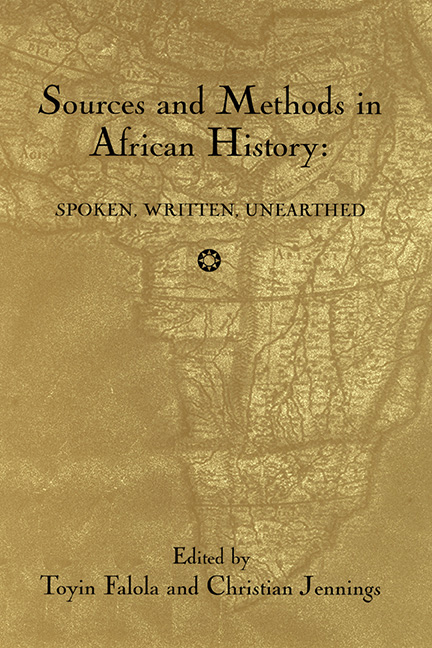Book contents
- Frontmatter
- Dedication
- Contents
- Acknowledgments
- Introduction
- Part I Archaeological Sources
- Part II Africa and the Atlantic World
- Part III Documentary Sources
- 10 Section Introduction: New Approaches to Documentary Sources
- 11 They Called Themselves Iloikop: Rethinking Pastoralist History in Nineteenth-Century East Africa
- 12 Interpreting Cases, Disentangling Disputes: Court Cases as a Source for Understanding Patron-Client Relationships in Early Colonial Lagos
- 13 Capricious Tyrants and Persecuted Subjects: Reading between the Lines of Missionary Records in Precolonial Northern Namibia
- Part IV Oral Tradition
- Part V Innovative Sources and Methods
- Contributors
- Index
13 - Capricious Tyrants and Persecuted Subjects: Reading between the Lines of Missionary Records in Precolonial Northern Namibia
from Part III - Documentary Sources
Published online by Cambridge University Press: 25 October 2017
- Frontmatter
- Dedication
- Contents
- Acknowledgments
- Introduction
- Part I Archaeological Sources
- Part II Africa and the Atlantic World
- Part III Documentary Sources
- 10 Section Introduction: New Approaches to Documentary Sources
- 11 They Called Themselves Iloikop: Rethinking Pastoralist History in Nineteenth-Century East Africa
- 12 Interpreting Cases, Disentangling Disputes: Court Cases as a Source for Understanding Patron-Client Relationships in Early Colonial Lagos
- 13 Capricious Tyrants and Persecuted Subjects: Reading between the Lines of Missionary Records in Precolonial Northern Namibia
- Part IV Oral Tradition
- Part V Innovative Sources and Methods
- Contributors
- Index
Summary
On September 21, 1881, the Finnish Lutheran missionary Martti Rautanen reported in his diary that Sheya sha Namutenya, chief minister to Kambonde, king of Ondonga in modern-day northern Namibia, had died of a chronic abdominal illness. He continued, “Some eight days before his death a man was accused of witchcraft and killed. A woman was supposed to undergo the same fate, but she still had time to flee.” Nearly three weeks later Rautanen wrote, “Yet another man, Uusiku ua Nepaya, an owner of a large homestead, was shot dead on account of Sheya while he slept. O! Cruelty without measure!”
Decades later, an Ndonga man training to become a pastor wrote of the same time period:
I don't know my father. My father was killed when I was three years old. He was killed by king Kambonde Nehoya. The king himself did not kill my father, but the man who killed my father was sent by the king. It was a process of raiding. My father and I were sitting by the fire in the morning, warming our bodies, when the people from the king's house came to our house. I don't know the story; I tell it according to what I was told. My father was also one of King Kambonde's omalenga [advisers]. When the killers came to our house, they pretended to be peaceful. I was sitting in my father's lap when the gunmen killed my father.
By far the richest written documentation on the nineteenth-century history of much of Africa was produced as a result of mission endeavors. The Ovambo communities of northern Namibia and southern Angola, of which Ondonga was one, are no exception. The archival sources left by the Finns who dominated the Ovambo mission field include diaries, annual reports, correspondence, several published ethnographies, collections of proverbs and photographs, and a massive body of ethnographic fieldnotes from the 1930s, some written by literate, Christian Ovambo and the rest transcribed by a missionary who interviewed older Ovambo men in the local language. Also within these archives are records written by Ovambo, primarily male seminary students writing in the 1930s and 1940s about their lives and stories their parents told them.
- Type
- Chapter
- Information
- Sources and Methods in African HistorySpoken Written Unearthed, pp. 219 - 236Publisher: Boydell & BrewerPrint publication year: 2003



